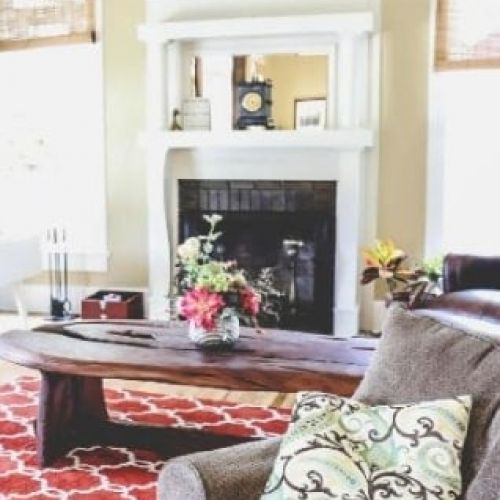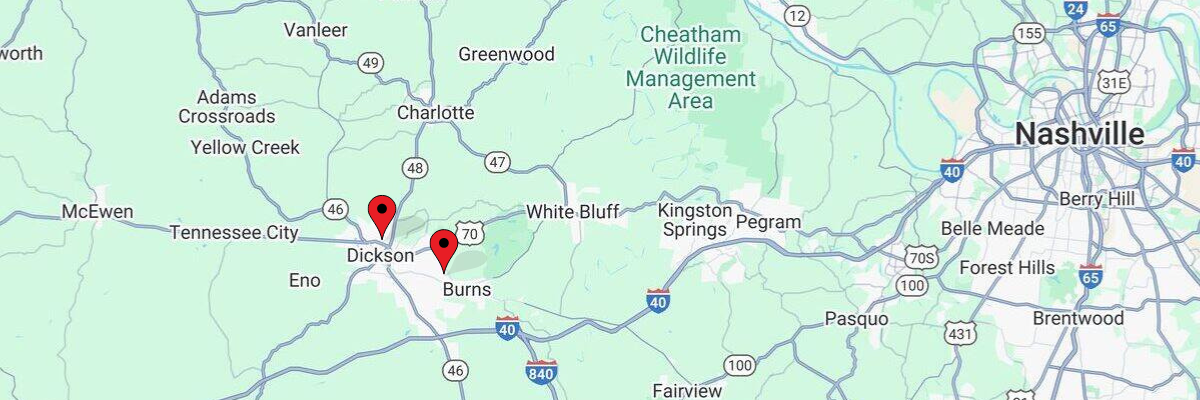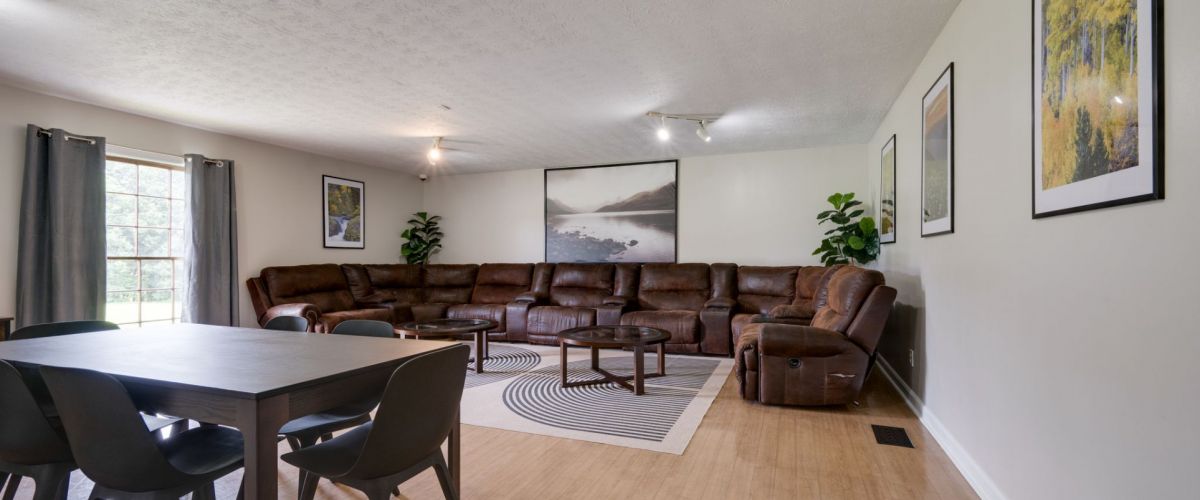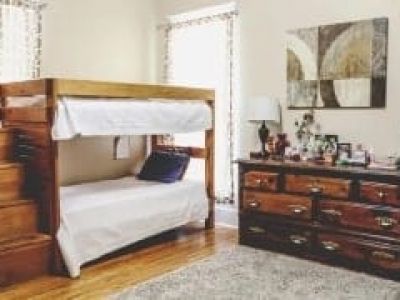Residential Treatment and Inpatient Rehab Program for Klonopin Addiction in Tennessee
Freeman Recovery Center provides Klonopin addiction rehab programs at two locations in Tennessee: Dickson and Burns. Both facilities offer an environment designed to support your recovery. Whether you’re seeking residential Klonopin addiction treatment or residential mental health programs for co-occurring conditions, Freeman Recovery Center delivers 24/7 care in a compassionate and professional setting.
If you’re struggling with substance abuse or dual diagnosis challenges, you’ll find specialized residential treatment for Klonopin abuse at Freeman Drug and Alcohol Addiction Center. Our inpatient Klonopin addiction rehab programs include intensive residential therapy to address both physical and mental health needs. Call (615) 645-3677 today to learn how residential Klonopin addiction treatment in Nashville, TN, can help you achieve lasting recovery.
Defining Klonopin Addiction and Abuse
Klonopin addiction occurs when you develop a physical dependence on Klonopin, often due to misuse or prolonged use. Klonopin, a benzodiazepine, is prescribed for anxiety and seizures, but its potential for abuse makes it dangerous. Signs of Klonopin abuse include euphoria from Klonopin use, drug-seeking behavior, and symptoms like nodding off (drowsiness from Klonopin) or slowed breathing (respiratory depression).
You may also develop collapsed veins or see track marks from Klonopin use. If you struggle with Klonopin cravings or experience Klonopin withdrawal symptoms (sweating, nausea, insomnia) when not using, you likely need professional help. Left untreated, Klonopin dependency can lead to serious risks, including Klonopin overdose or complications from illicit drug use. Recognizing these signs is the first step toward recovery.
Klonopin Abuse Treatment Statistics for Residential Treatment in the Nashville Area
Between 2019 and 2021, 1,666 fatal overdoses in Tennessee involved benzodiazepines, accounting for 28% of total overdose deaths. While the percentage of overdoses involving benzodiazepines dropped from 34% in 2015 to 19% in 2019, the prevalence of prescription benzodiazepine abuse remains significant.
In 2018, many patients received benzodiazepines for extended periods, increasing the risk of addiction. Residential treatment options for Klonopin addiction in Tennessee include non-hospital programs, with 72 of the 297 substance use treatment centers offering non-hospital residential services and 49 providing benzodiazepine detoxification. As Klonopin abuse continues to affect the state, residential programs play a key role in providing supportive recovery.

Book a Free Assessment
Contact us to schedule a free addiction or mental health assessment as part of our admissions process.
Check Your Insurance Coverage
Defining an Inpatient Treatment Center for Klonopin Addiction Near Nashville, TN
An inpatient Klonopin addiction rehab center near Nashville, TN, provides a supportive living environment where you can focus entirely on your recovery. At a facility like Freeman Recovery Center, you’ll benefit from 24/7 care in a residential recovery setting addressing the challenges of Klonopin dependency. These structured living arrangements ensure a safe and stable space to heal.
During your stay, you’ll participate in intensive residential therapy to address your substance use disorder, manage withdrawal from Klonopin, and develop skills to prevent relapse. If you’re struggling with co-occurring mental health issues, many of these centers offer residential dual diagnosis treatment.
Klonopin Addiction Residential Inpatient Treatment Centers in the Nashville Area
If you’re looking for residential Klonopin abuse treatment in the Nashville area, Freeman Recovery Center is here to help. Our detoxification and inpatient rehab facility at 1615 Highway 96, Burns, TN 37029, offers a supportive living environment. With 24/7 care and personalized programs, we focus on helping you overcome Klonopin addiction and regain control of your life.
Our live-in treatment programs address substance use disorder, Klonopin withdrawal symptoms, and co-occurring mental health conditions through residential dual diagnosis treatment and intensive residential therapy. Start your recovery in a supportive living environment designed for sustained sobriety. Call (615) 645-3677 to learn more about our residential Klonopin treatment in Nashville, TN.
Check Your Insurance for Residential Inpatient Treatment

What Does Klonopin Addiction and Abuse Withdrawal Involve?
Klonopin addiction and abuse withdrawal involve both physical and psychological symptoms that can be challenging without professional help. When you stop using Klonopin, you may experience Klonopin withdrawal symptoms (sweating, nausea, insomnia). Severe withdrawal can lead to tremors, seizures, or heightened Klonopin cravings, making it critical to seek medical supervision.
Withdrawal also includes addressing physical dependence on Klonopin and overcoming symptoms like slowed breathing (respiratory depression) or nodding off (drowsiness from Klonopin) that may have occurred during use. Medically supervised detoxification in a therapeutic community ensures your safety and comfort while managing these symptoms. You’ll also begin intensive residential therapy to address the underlying causes of Klonopin dependency and build a foundation for recovery.
What Are the Signs and Symptoms of Klonopin Abuse and Addiction?
The signs and symptoms of Klonopin abuse and addiction often include noticeable changes in your physical, emotional, and behavioral health. Physically, you might experience slowed breathing (respiratory depression), excessive drowsiness or nodding off, and even collapsed veins if misuse involves injections. You could also develop a physical dependence, leading to withdrawal when you try to stop.
Emotionally, you may notice increased anxiety, mood swings, or Klonopin cravings. Behaviorally, drug-seeking behavior, such as visiting multiple doctors for prescriptions or engaging in illicit drug use, can occur. If you’re chasing the euphoria from Klonopin use, it’s a sign that misuse has become a serious problem.
What Medications Are Administered for Klonopin Abuse at Inpatient Programs in the Nashville Area?
In inpatient Klonopin addiction rehab in the Nashville area, medications are often used to manage withdrawal symptoms and support recovery. A common approach involves gradually tapering to lower doses of Klonopin under medical supervision. This helps minimize the severity of withdrawal symptoms, such as anxiety, insomnia, and Klonopin cravings while reducing the risk of complications like seizures.
Other medications, such as topiramate or gabapentin, may be administered to manage symptoms like mood instability or nerve pain caused by physical dependence on Klonopin. These medications also help stabilize your condition during detoxification. In an in-house rehabilitation setting, you’ll receive 24/7 monitoring to ensure your safety.
Check Your Insurance Coverage
Long-Term Residential Treatment Programs for Klonopin Addiction Around Nashville, TN
Long-term residential treatment programs for Klonopin addiction near Nashville, TN, provide a comprehensive approach to recovery. These holistic residential treatment programs combine structured living, 24/7 care, and evidence-based therapies to help you overcome Klonopin dependency and build lasting habits for sobriety.
30-Day Residential Inpatient Klonopin Addiction Programs
A 30-day residential inpatient Klonopin addiction program takes a focused and intensive approach to your recovery. During this time, you’ll receive 24/7 care in a supportive living environment, allowing you to safely manage withdrawal from Klonopin and begin addressing the root causes of your addiction.
These residential addiction programs offer a blend of intensive residential therapy, group counseling, and medical supervision to help you overcome Klonopin addiction. You’ll build healthy coping mechanisms through structured daily schedules and learn strategies to avoid relapse. This short-term option is ideal if you seek a safe recovery residence environment to kickstart your sobriety. By the end of residential Klonopin addiction treatment in Nashville, TN, you’ll feel more prepared to transition into ongoing care or outpatient support.
60-Day Residential Inpatient Klonopin Addiction Programs
A 60-day program at a residential Klonopin abuse treatment facility offers a more extended recovery experience, providing additional time to address the complexities of Klonopin abuse. Over two months, you’ll benefit from 24/7 care, allowing for in-depth detoxification and gradual tapering off Klonopin. This extended stay allows you to work through cravings, withdrawal, and any underlying mental health issues.
In addition to intensive residential therapy, you’ll participate in counseling, relapse prevention education, and holistic therapies. The longer duration helps you solidify new coping strategies for a stronger foundation for lasting recovery. After residential substance abuse treatment, you’ll feel more confident and prepared for the next stage in your recovery.
90-Day Residential Inpatient Klonopin Addiction Programs
A 90-day residential inpatient Klonopin addiction program offers the longest and most comprehensive treatment option, giving you ample time to fully address Klonopin dependency. This program provides a structured living environment with 24/7 care, allowing you to taper off Klonopin at a pace that suits your needs while managing withdrawal symptoms and Klonopin cravings.
During these three months, you’ll engage in intensive residential therapy that combines individual counseling, group therapy, and holistic treatment approaches. With extended care, you’ll have the time to delve deeper into the psychological and emotional factors that contribute to your addiction. This program helps you build lasting habits and coping strategies, ensuring a stronger foundation for sustained recovery and a successful transition into life after residential Klonopin treatment in Nashville, TN.
6-Month, 12-Month, and 24-Month Residential Inpatient Klonopin Addiction Programs
Six-month, 12-month, and 24-month residential inpatient Klonopin addiction programs offer extended care if you need long-term support in overcoming Klonopin dependency. These long-term residential care programs provide a structured living environment with 24/7 care, allowing you to move at your own pace while receiving continuous therapy for both physical and emotional healing.
With a longer stay, you’ll have time to work through deep-rooted challenges like Klonopin cravings, withdrawal symptoms, and any co-occurring mental health issues. Each full-time recovery program integrates intensive residential therapy, individual counseling, and holistic treatments, giving you the tools to develop lifelong coping strategies. Extended treatment ensures you’re fully prepared for life after recovery, equipped with the confidence and skills to maintain your sobriety in the long term.
Short-Term Residential Treatment Programs for Klonopin Addiction Around Nashville, TN
Short-term residential treatment programs for Klonopin addiction around Nashville, TN, offer intensive care over a shorter duration to help you begin your recovery. These in-residence addiction treatment programs provide a supportive living environment with 24/7 care, focusing on detoxification, managing withdrawal symptoms, and developing essential coping strategies. Explore the various options available for short-term recovery success.
Weekend Residential Inpatient Klonopin Addiction Programs
A weekend residential inpatient Klonopin addiction program offers a quick, focused approach to start your recovery. Throughout a weekend, you’ll receive 24/7 care and participate in intensive residential therapy to begin addressing Klonopin addiction and withdrawal symptoms. This short stay helps you regain control and build a foundation for ongoing treatment.
3-Day, 5-Day, and 7-Day Residential Inpatient Klonopin Addiction Programs
A three-, five-, or seven-day residential inpatient Klonopin addiction program provides short-term intensive care to help you manage withdrawal symptoms and stabilize your condition. During your stay at a residential rehabilitation center, you’ll receive 24/7 care while focusing on Klonopin cravings and detoxification. This time allows you to begin your recovery and prepare for the next phase of treatment.
10-Day, 14-Day, 21-Day Residential Inpatient Klonopin Addiction Programs
A 10-day, 14-day, or 21-day residential inpatient Klonopin addiction program offers a balanced approach to recovery. These short-term programs provide 24/7 care and structured living, focusing on Klonopin withdrawal and managing Klonopin cravings. The intensive therapy during this time helps you stabilize and address addiction, preparing you for longer-term recovery or outpatient care.

Does Private Health Insurance Cover Residential Inpatient Treatment for Klonopin Addiction in Tennessee?
Yes, private health insurance often covers residential Klonopin treatment in Nashville, TN. Many insurance providers offer coverage for substance use disorder treatment, including detoxification and residential rehab programs. The extent of coverage depends on your plan, but most policies will cover a portion of the costs for inpatient care, therapy, and medications needed during recovery.
It’s important to contact Freeman Alcohol and Drug Addiction Center to verify your coverage details, including deductibles, copayments, limitations, and exclusions. Some plans may also offer coverage for residential dual diagnosis treatment if you have co-occurring mental health conditions. We can help you navigate insurance benefits and work with your provider to ensure you get the care you need.
How Much Does Residential Klonopin Addiction Treatment Cost Without Insurance?
If you do not have insurance, treatment at a residential Klonopin abuse treatment facility can be costly. On average, a Tennessee residential rehab program can cost around $56,600. This amount typically includes detoxification, therapy, 24/7 care, and other services provided during your stay.
Costs can vary depending on the treatment center, the length of your stay, and any additional therapies required. For many, out-of-pocket expenses can be significant, but there may also be financial assistance options, including sliding-scale fees or payment plans. If you’re concerned about the cost, contact us directly at Freeman Addiction Recovery Center for more details on payment options and financial support.
How Much Does Residential Klonopin Addiction Treatment Cost With Insurance?
If you are insured, the cost of residential Klonopin addiction treatment can vary depending on your specific plan and coverage. If you enroll in residential Klonopin addiction treatment in Nashville, TN, you can expect to pay around $56,600. However, your insurance may cover a portion of this cost, reducing your out-of-pocket expenses.
It’s important to check your policy and contact Freeman Substance Abuse Recovery Center to understand your benefits, including deductibles, copayments, and coverage limits for residential Klonopin abuse treatment. Many plans will cover a substantial portion of residential Klonopin addiction treatment, especially if the program is in-network. Freeman Recovery Center can help you verify your insurance coverage and explore all available financial options, ensuring you get the care you need without unnecessary financial strain.
What Does the Admissions Process Look Like for Residential Klonopin Treatment at Freeman Recovery Center?
The admissions process for residential Klonopin abuse treatment at Freeman Recovery Center is straightforward and designed to ensure you receive the best care. First, you’ll complete an initial assessment, where our team will gather information about your Klonopin addiction and medical history. This helps us tailor your treatment plan to meet your specific needs.
Next, we’ll verify your insurance coverage (if applicable) and discuss available payment options. After confirming your enrollment, you’ll be welcomed into our residential Klonopin abuse treatment facility and begin treatment. Throughout your stay, you’ll receive 24/7 care, therapy, and a structured schedule designed to help you manage withdrawal symptoms and cravings. Our admissions team is here to guide you every step of the way.
Data and Statistics on Residential Klonopin Addiction Treatment in Tennessee
- According to the journal Annals of Medicine, there were 1,666 fatal drug overdoses involving benzodiazepines between 2019 and 2021, out of a total of 5,916 overdoses among adult Tennessee residents. Of these deaths, 80.7% involved prescription benzodiazepines.
- The percentage of drug overdoses involving benzodiazepines in Tennessee decreased from 34% in 2015 to 19% in 2019, according to the Tennessee Department of Health’s 2021 annual overdose report.
- In 2018, about half the patients who were prescribed benzodiazepines received a supply large enough to last two months or longer, according to Vanderbilt University Medical Center.
- According to SAMHSA’s 2022 National Substance Use and Mental Health Services Survey, 72 out of 297 substance use treatment centers in Tennessee offered non-hospital residential treatment; 49 offered benzodiazepine detoxification services.
- According to a December 2022 legislative brief from the Tennessee Comptroller of the Treasury, about 25% of Tennessee’s treatment facilities offer residential services outside of a hospital setting, such as in a recovery community or rehabilitation center, while 5% provide inpatient services within a hospital.
Connect With Us For An Assessment Today




